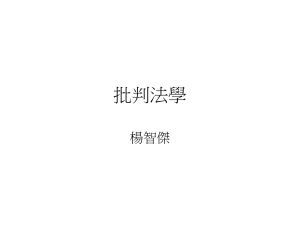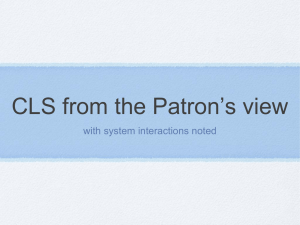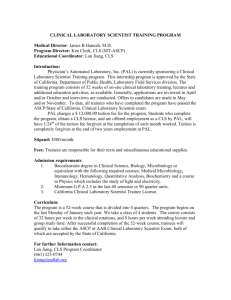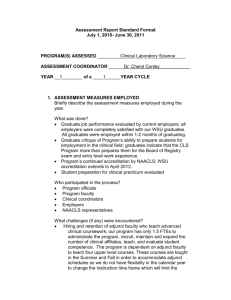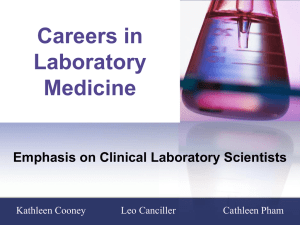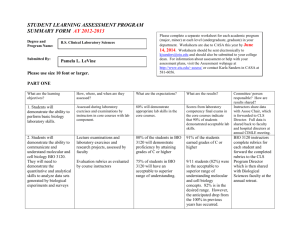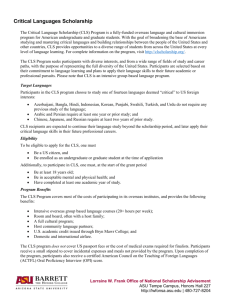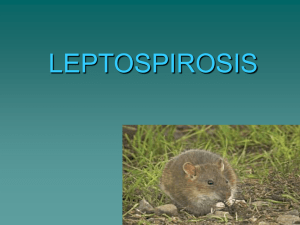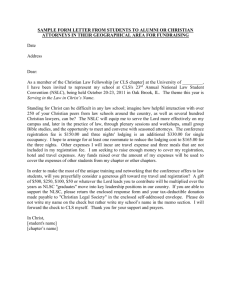CLS
advertisement
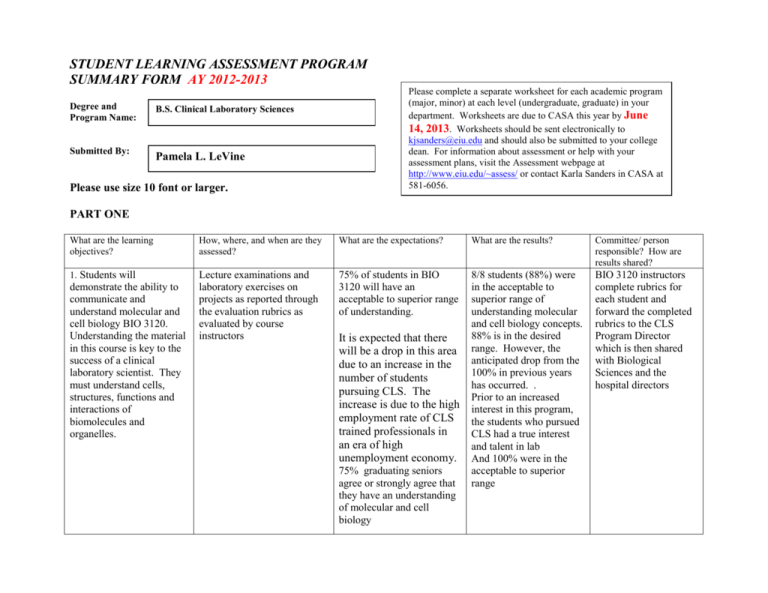
STUDENT LEARNING ASSESSMENT PROGRAM SUMMARY FORM AY 2012-2013 Degree and Program Name: B.S. Clinical Laboratory Sciences Submitted By: Pamela L. LeVine Please use size 10 font or larger. Please complete a separate worksheet for each academic program (major, minor) at each level (undergraduate, graduate) in your department. Worksheets are due to CASA this year by June 14, 2013. Worksheets should be sent electronically to kjsanders@eiu.edu and should also be submitted to your college dean. For information about assessment or help with your assessment plans, visit the Assessment webpage at http://www.eiu.edu/~assess/ or contact Karla Sanders in CASA at 581-6056. PART ONE What are the learning objectives? How, where, and when are they assessed? What are the expectations? What are the results? Committee/ person responsible? How are results shared? 1. Students will Lecture examinations and laboratory exercises on projects as reported through the evaluation rubrics as evaluated by course instructors 75% of students in BIO 3120 will have an acceptable to superior range of understanding. 8/8 students (88%) were in the acceptable to superior range of understanding molecular and cell biology concepts. 88% is in the desired range. However, the anticipated drop from the 100% in previous years has occurred. . Prior to an increased interest in this program, the students who pursued CLS had a true interest and talent in lab And 100% were in the acceptable to superior range BIO 3120 instructors complete rubrics for each student and forward the completed rubrics to the CLS Program Director which is then shared with Biological Sciences and the hospital directors demonstrate the ability to communicate and understand molecular and cell biology BIO 3120. Understanding the material in this course is key to the success of a clinical laboratory scientist. They must understand cells, structures, functions and interactions of biomolecules and organelles. It is expected that there will be a drop in this area due to an increase in the number of students pursuing CLS. The increase is due to the high employment rate of CLS trained professionals in an era of high unemployment economy. 75% graduating seniors agree or strongly agree that they have an understanding of molecular and cell biology CLS Student Survey 100% passing rate on the National Accrediting Agency for Clinical Laboratory Sciences (NAACLS) exam National Accrediting Agency for Clinical Laboratory Sciences exam (NAACLS): Molecular and cellular biological components are a significant portion of the exam. Passing this exam would indicate strength in molecular and cellular biological science knowledge 2. Students will demonstrate the ability to communicate and understand immunological concepts BIO 3210. Understanding the material in this course is another key to the success of a clinical laboratory scientist. They must understand how the relationship between the body systems, pathogens, and immunity. Lecture examinations and laboratory exercises on projects as reported through the evaluation rubrics as evaluated by course instructors 75% of students in BIO 3210 will have an acceptable to superior range of understanding. It is expected that there will be a drop in this area due to an increase in the number of students pursuing CLS. The increase is due to the high employment rate of CLS trained professionals in an era of high unemployment economy. The CLS students did agree or strongly agree that the CLS curriculum enhanced their understanding of molecular and cell biology concepts. The CLS Program Director tabulates the data and shares the information with the Biological Sciences Dept and the hospital directors 100% of the 2011 graduates passed the NAACLS exam. Although the competition has been increasing and the potential for student success in BIO 3120 may decline, I fully expect the percent of students passing the NAACLS to remain close to 100%. 8/9 (88%) students were in the acceptable to superior range of understanding immunological concepts. 88% is in the desired range. However, the anticipated drop from the 100% in previous years has occurred. Prior to an increased interest in this program, the students who pursued CLS had a true interest and talent in lab And 100% were in the acceptable to superior range . The affiliated hospital coordinate testing through NAACLS and share pass/fail information with the CLS Program Director BIO 3210 instructors complete rubrics for each student and forward the completed rubrics to the CLS Program Director which is then shared with Biological Sciences and the hospital directors 3. Students will demonstrate critical thinking skills. A necessary component as a clinical laboratory scientist. At the very least the student needs to identify different experimental approaches, be able to extract some information from descriptive passages and present results. CLS Student Survey 75% graduating seniors agree or strongly agree that they have an understanding of immunology National Accrediting Agency for Clinical Laboratory Sciences exam (NAACLS): Immunology components are a significant portion of the exam. Passing this exam would indicate strength in molecular and cellular biological science knowledge. 100% passing rate on the National Accrediting Agency for Clinical Laboratory Sciences (NAACLS) exam Laboratory exercises on course projects as reported through the evaluation rubrics 75% of students will have an acceptable to superior range of demonstrated critical thinking skills The CLS students did agree or strongly agree that the CLS curriculum enhanced their understanding of immunological concepts The CLS Program Director tabulates the data and shares the information with the Biological Sciences Dept and the hospital directors 100% of the 2011 graduates passed the NAACLS exam. Although the competition has been increasing and the potential for student success in BIO 3120 may decline, I fully expect the percent of students passing the NAACLS to remain close to 100%. The affiliated hospital coordinate testing through NAACLS and share pass/fail information with the CLS Program Director 16/18 (88%) students demonstrated acceptable to superior ranges of critical thinking skills. 88% is in the desired range. However, the anticipated drop from the 100% in previous years has occurred. Students are entering the program without the necessary skills to succeed. They just know of the high employment opportunities in this high unemployment economy. Molecular and Cell biology BIO 3120 and Immunology BIO 3210 instructors complete rubrics and share with CLS Program Director which is then shared with Biological Sciences and the hospital directors 4. Students will CLS Student Survey 75% of graduating seniors agree or strongly agree that the program enhanced their critical thinking skills CLS Student Survey 75% of students will indicate that they had an acceptable to superior range of demonstrated writing skills Electronic Writing Portfolios Students will obtain at least a passing rating (3-4) on the Electronic Writing Portfolio demonstrate their ability to write effectively. To succeed as a professional students, need to have strong written communication skills. The CLS students did agree or strongly agree that the CLS curriculum enhanced their critical thinking skills 3/4 students indicated that they had an acceptable to superior range of writing skills Information shared with Biological Sciences and hospital directors 3.46 is the average EWP score where the campus average is 3.43. Information received from Karla Sanders. CLS Program Director sends survey to students finishing their hospital rotation. The students then send back their responses to the CLS Program Director which is then shared with Biological Sciences and the hospital directors (Continue objectives as needed. Cells will expand to accommodate your text.) PART TWO Describe your program’s assessment accomplishments since your last report was submitted. Discuss ways in which you have responded to the CASA Director’s comments on last year’s report or simply describe what assessment work was initiated, continued, or completed. Learning Objectives: Additional descriptors in critical thinking behaviors was incorporated. How, Where…: explanation of the importance of the NAACLS exam is how its results represent student knowledge of molecular and cellular biology as well as immunology. Expectations: Analyzed data from last year to create prediction for at least next year. Results: Based on data, implications for the program are shared and compared to previous years. PART THREE Summarize changes and improvements in curriculum, instruction, and learning that have resulted from the implementation of your assessment program. How have you used the data? What have you learned? In light of what you have learned through your assessment efforts this year and in past years, what are your plans for the future? In the past 3 years we have student comments which indicate that they value their education in the CLS program. Immediate employment in field of training remains at 100% which has resulted in explosive growth in CLS enrollment. We are beginning to see the negative side of the interest in this program as there are students who are weak in the sciences wanting to pursue the field. Although it becomes more difficult to gain admission to the hospitals for the final year internship, those that do make it in, are very strong candidates. To ensure that students have a viable backup plan, due to this rise in competition, there were some modifications made to the CLS program to align the required coursework and electives to more closely replicate the Biological Science degree. The program modification also incorporated some additional electives that would strengthen their biological sciences background.
